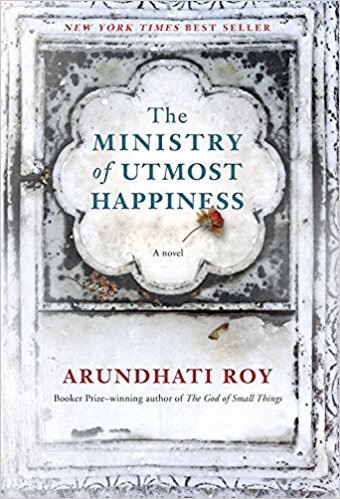风语悄悄
人在天涯意随风
正文
二十年前,堪比模特的印度美女作家Arundhati Roy因第一部小说The God of Small Things (微物之神) 而声名鹊起,一路斩获各种大奖,包括含金量最重的Man Booker Prize。经历传奇,敢作敢为,Roy一下子成了媒体宠儿。不同于众多旅居海外的以英文写作的印度作家,二十年来,她一直坚持本土写作,包括许多传记文学,关注着印度底层和环境污染问题。二十年后的2017年, Roy出版了她的第二本小说,The ministry of Utmost Happiness(极乐署)。

这本书通过两个截然不同的女人,将读者带进鲜少可以在文学作品中看到的印度社会。全书大致分成三个部分,讲变性女子Anjum,讲爱上了喀什米尔激进组织领袖的Naga,讲她们渐渐交织在一起的生活。此书的开篇,让人非常难忘。
“At magic hour, when the sun is gone but the light has not, armies of flying foxes unhinge themselves from the Banyan trees in the old graveyard and drift across the city like smoke. When the bats leave, the crows come home. Not all the din of their homecoming fills the silence left by the sparrows that have gone missing, and the old white-backed vultures, custodians of the dead for more than a hundred million years, that have been wiped out. The vultures died of diclofenac poisoning. Diclofenac, cow aspirin, given to cattle as a muscle relaxant, to ease pain and increase the production of milk, works—worked—like nerve gas on white-backed vultures. Each chemically relaxed milk-producing cow or buffalo that died became poisoned vulture bait. As cattle turned into better dairy machines, as the city ate more ice cream, butterscotch-crunch, nutty-buddy and chocolate-chip, as it drank more mango milkshake, vultures’ necks began to droop as though they were tired and simply couldn’t stay awake. Silver beards of saliva dripped from their beaks, and one by one they tumbled off their branches, dead.”
这样的开始似乎预示着,magic是注定破灭的梦想,是无法满足的渴望,正如夕阳西下时,那一只只从空中坠落的鸟。
Anjum的故事,仿佛过山车,生在一个温暖又爱他/她的家庭里,却最终沦为以墓地为家。她像一棵树,古老坚韧,伤痕累累。Naga身上一定有Roy自己的影子吧。这是一个特立独行的女子,爱了便义无反顾。大概只有在作家的笔下,这样两个人生的轨迹才会交汇,充满戏剧,充满宿命,充满magic。与Mistry写的A Fine Balance一书不同,Roy到底没有让人彻底绝望。她让那些社会的misfits在墓地里建造了属于自己的极乐署,找到了虽然随时随地有可能化为乌有,但却最类似幸福的感觉。在印度,女性的地位依然十分卑微。而Anjum仍然一心一意地要做女人,做母亲。个中滋味,何以言说。。。
想想前些时候看过的一些印度电影,《三个傻瓜(3 Idiots)》或是《摔跤吧,爸爸》,读这样的书,刚好可以互补一下吧。印度这个背着许多包袱,拼命地想把左邻右舍都甩在身后的古老国度,有时看着真是眼熟啊。。。

评论
目前还没有任何评论
登录后才可评论.




